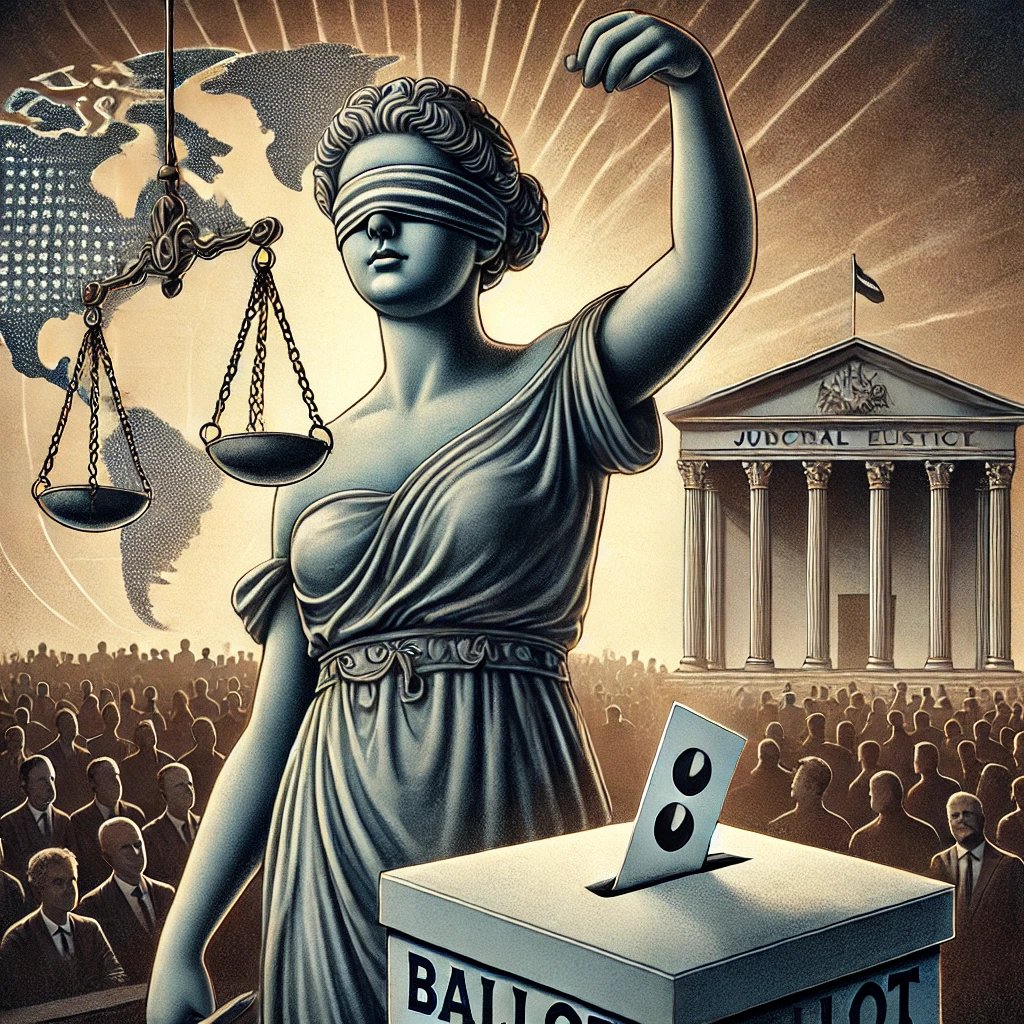Justice on the Ballot: Mexico’s Bold Experiment and Global Risks
DISCUSSING ALOUD
9/17/20245 min read


PIC: ChatGPT


Bureau of Society and Transformation
The judicial reforms in Mexico, which propose electing judges by popular vote, invite profound reflection on a question with global implications: Can a legal system effectively balance justice with popularity, or do the two stand in fundamental opposition? This shift toward an elected judiciary is not just a Mexican issue; it raises questions relevant to democracies worldwide. As the reforms unfold, they signal a potential redefinition of justice—one that may not be blindfolded anymore, but peering directly into the hearts and minds of the electorate.
The Illusion of Justice: Merit vs. Popularity
The traditional imagery of the blindfolded goddess of justice represents impartiality, with justice being dispensed without bias or regard for status, influence, or public opinion. However, this ideal has often been elusive. In Mexico, where corruption, nepotism, and impunity have marred the judicial system, this ideal of justice has been undermined by what many see as a system rigged to serve the powerful. The judiciary’s insulation from the public has often meant that it is also insulated from accountability.
This puzzle is not unique to Mexico. Across the world, judicial systems have grappled with ensuring fairness while maintaining the independence of judges from political and public pressures. The Mexican reforms, by proposing the election of judges through popular vote, raise a provocative question: Can justice remain impartial if it is subject to the whims of an electorate? In an age where social media amplifies popular sentiment and populism shapes elections, this question has significant global resonance.
Breaking the Blindfold: The New Role of Judges
Electing judges by popular vote challenges the notion of judicial independence in a way few other reforms have. Judges, traditionally seen as arbiters of the law, now risk becoming actors in the political theater. The notion of impartial justice, symbolized by the blindfolded figure, could be replaced by a justice that is conscious of—and perhaps swayed by—the crowd’s will. In this scenario, the role of a judge could shift from an interpreter of the law to an instrument of public sentiment.
This raises a deeper issue: Are we moving toward a world where justice is tailored to suit popular demand, rather than being a principled application of the law? If a judge’s survival depends on votes, decisions may be made based on what is palatable to the electorate, not what is legally or ethically sound. While this sounds like a dangerous compromise, it also speaks to a broader shift in governance where democratic participation extends into areas traditionally shielded from direct popular control.
Justice as Popularity Contest: Lessons from Global Democracies
The Mexican reform is not an isolated phenomenon. The global rise of populism has often seen the judiciary painted as an elitist, unaccountable body. In countries like the United States, where judges in certain jurisdictions are already elected, questions persist about whether these judges can remain neutral arbiters or whether they are forced into decisions that please their voter base. For example, during highly polarizing issues such as abortion rights or gun control, the judiciary often finds itself at the center of political debates. Elections can make it harder for judges to stay immune to the political winds.
Similarly, in countries like India, where the judiciary has historically been viewed as a guardian of constitutional principles, recent tensions between the judiciary and the executive have raised concerns about independence. The balancing act between holding judges accountable and ensuring they are not overly influenced by the ruling powers is a delicate one. Mexico’s reforms are an extreme example of one potential solution to this dilemma, but they also force us to ask whether electing judges en masse risks turning the judiciary into a mirror of public sentiment, rather than a reflection of legal consistency.
PIC:Canva
Who We Are:
The Economic Nations champions global unity through economic collaboration, focusing on sustainable growth, reducing inequalities, and enhancing global relationships for mutual prosperity and peace.
______________________________________
The Global Appeal of Justice, Corruption, and Democracy
Corruption is often the justification for major judicial overhauls, and indeed, many in Mexico see the reforms as an opportunity to dismantle entrenched judicial elites who have long benefitted from opaque, corrupt practices. This populist narrative—rooting out the old guard to make way for a more accountable, people-centered justice system—resonates with citizens not just in Mexico but in democracies around the world that are frustrated with judicial systems that appear out of touch with everyday realities.
However, there is a paradox inherent in this narrative: while popular control may seem like a solution to judicial corruption, it can also expose the judiciary to new forms of manipulation. In the age of globalized media, where misinformation campaigns and deep political polarization dominate public discourse, judicial candidates—like politicians—may be judged less on merit and more on their ability to rally voter support. This opens the door to a kind of mob justice, where legal decisions are influenced by populist pressure, rather than sound legal reasoning.
The Danger of Populism in the Judiciary: A Slippery Slope
The danger of populism creeping into the judiciary is not theoretical. History has shown us that populist movements often erode institutional safeguards in the name of “the will of the people.” In countries like Hungary and Poland, the erosion of judicial independence has accompanied the rise of populist governments, leading to democratic backsliding. Courts that were once pillars of justice and checks on government power have become tools of executive control.
Mexico, by introducing elections for its judiciary, risks falling into a similar trap. If judges must appeal to voters to remain in office, what happens when the electorate’s interests conflict with the law? Or worse, what happens when powerful forces—be it drug cartels in Mexico or political parties in other countries—manipulate the judicial elections through intimidation or bribery? In this scenario, the judiciary becomes less a defender of justice and more an arena for political power struggles.
Reimagining Justice: Is There a Middle Path?
What the Mexican reforms highlight, however, is a legitimate crisis of confidence in traditional legal systems. In many countries, the judiciary is seen as remote, bureaucratic, and complicit in upholding the status quo. Calls for greater accountability are not without merit, and the challenge is finding ways to reform judicial systems without undermining their independence.
One possibility is a hybrid model that maintains merit-based appointments but increases transparency and public oversight. Judicial review boards, greater public engagement in the vetting of judges, and term limits could be introduced without turning the judiciary into a purely political institution. Such a model could balance the need for judicial independence with demands for accountability.
In this sense, Mexico’s experiment might offer a global lesson: that justice systems must evolve to remain relevant and credible in the eyes of the public. But this evolution must be carefully managed to avoid sacrificing the impartiality that is the cornerstone of any functioning legal system.
Conclusion: A Global Legal Reckoning
The judicial reforms in Mexico are more than just a domestic issue; they are a bellwether for the broader global struggle to balance democracy with the rule of law. The tension between being just and being popular is one that all democracies must confront as they grapple with the populist waves sweeping across the globe.
As Mexico embarks on this radical legal experiment, the world watches to see whether it will herald a new era of democratized justice or mark the beginning of judicial chaos. The goddess of justice may soon find herself not only unblindfolded but also cast into the arena of public opinion—a reality that democracies around the world will need to reckon with. Whether this is a necessary adaptation or a perilous gamble remains to be seen, but its implications will undoubtedly shape how justice is delivered in the future.
Contacts
enquiry@economicnations.org
(xx) 98-11-937-xxx (On verification)
